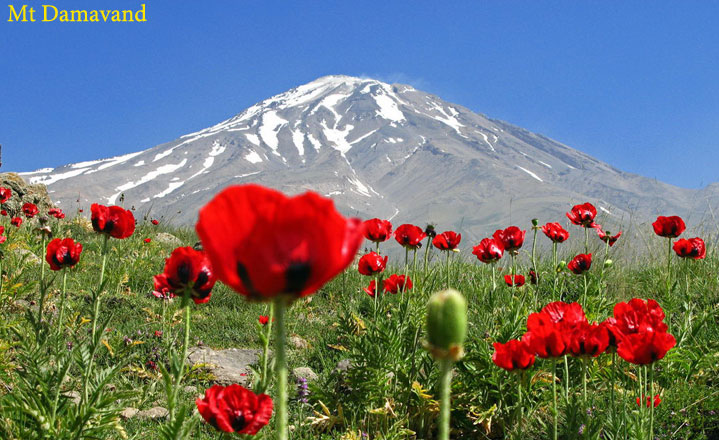The origin of the Proterozoic Choghart iron oxide deposit in the Bafq mining district of Central Iran has been the subject of a long-standing dispute. Some authors believe that it was formed from magma, while others suggest metasomatic replacement of preexisting rocks. The present study on the basis of new oxygen isotope, REE and geochemical data concludes that neither of these two hypotheses can alone explain the formation of Choghart deposit. Instead, it is suggested that the separation of an iron oxide melt and the ensuing hydrothermal processes dominated by alkali metasomatism were both involved to different degrees in the formation of Choghart and other similar deposits in Central Iran.
MOORE & MODABBERI.

Choghart Iron Deposite is one of the largest iron ore mines of Iran, which is located in the northeast of Bafgh-Yazd. The minable reserve is more than 170 million tons. This mine is extracted by surface mining method.
Mining operations usually include the five stages of drilling, blasting, loading, hauling and crushing. Loading and Transporting is done with truck-Shovel system.

Drilling and blasting operations are so important, because of some reasons such as: complex discontinuity system existence, the rock type variations and the water bearing beds.
- Choghart Mine Characteristics:
- Shape and Size of pit: Ellipse (840m Long Diagonal & 640m Width Diagonal)
- Stripping ratio: 0.85
- Highest Level: 1140 m
- Pit Depth: 327.5 m
- Overall Slope Angle: 55 degree
- Bench Height: 10 m (from 1140 to 1100 level), 12.5 m (from 1100 to 812.5 level)
- Shovel capacity: 7.6 m3
- Truck capacity: 85 ton
- Ore Specification: ( Fe: 66% & P: 0.12% )
- Chaghart Expansion Project
Objects of this Choghart Expansion Project, which has been started since 1989, are:
- To secure the supply of 3 Mt/y of suitable DSO feed (Direct Shipping Ore) for Blast Furnace
- To produce 3.2 Mt/y Iron concentrate as feed to Agglomeration Plant.
Due to existence of differences between the mined ores from Choghart and Sechahoun mines, two separate processing lines have been considered.

- Choghart Beneficiation Plant
A 3.2 Mt/y fine concentration beneficiation plant consisting of two independent process lines, as below:
- Choghart Process Line, with the feed capacity of 2.3 Mt/y produce 1.6 Mt/y fine concentrate
- Choghart production line
The mined low grade high phosphorous Choghart Iron Ore rocks of about 1000 mm size are crushed to 300mm by a primary jaw crusher.

The crushed ore is then transferred to the stockpiling and reclamation area for mixing and homogenizing. The stockpiling is carried out by a stocker. Then, using reclaimer and a conveyor belt, the stockpiled crusherd ore is delivered to a 2000 tons bin, where it is fed to Autogenous (AG) mill by a vibrating feeder.
The AG mill is in closed circuit with a vibrating screen with 1 mm aperture. The screen oversize returns to the AG mill as recirculating load and the undersize material is fed to the low intensity magnetic separators (LIMS), which consists of two separation stages (Rougher and Cleaner).The rougher concentrate is fed to the cleaner separators. Then the cleaner concentrate is being dewatered by pumping it to the filteration section. The tailing from rougher and cleaner stages is pumped to a hydrocyclone for adjusting its solid content (dewatering), and then it is pumped to scavenger magnetite separators for recovery of its Iron Content. The scavenger concentrate is also being dewatering by filteration. The obtained Iron Ore concentrates are transferred from filteration section to stockpiling area for storage by belt conveyors. And from there, they will be delivered to the loading station.

- Se-Chahoun production line
The mined low grade high phosphorous Choghart Iron Ore rocks of about 1000 mm size are crushed to 300mm by a primary jaw crusher. The crushed ore is then transferred to the stockpiling and reclamation area for mixing and homogenizing. The stockpiling is carried out by a stocker. Then, using reclaimer and a conveyor belt, the stockpiled crusherd ore is delivered to a 2000 tons bin, where it is fed to Autogenous (AG) mill by a vibrating feeder.
The AG mill is in closed circuit with a vibrating screen with 1 mm aperture. The screen oversize returns to the AG mill as recirculating load and the undersize material is fed to the low intensity magnetic separators (LIMS), which consists of two separation stages (Rougher and Cleaner). The rougher concentrate is fed to the cleaner separators. Then the cleaner concentrate is being dewatered by pumping it to the filteration section.


